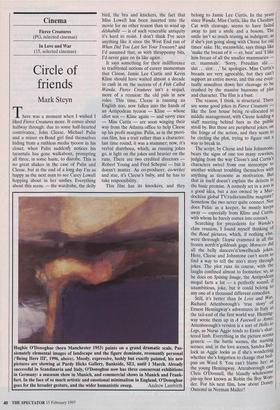Cinema
Fierce Creatures (PG, selected cinemas) In Love and War (15, selected cinemas)
Circle of friends
Mark Steyn
There was a moment when I wished I liked Fierce Creatures more. It comes about halfway through: due to some half-hearted contrivance, John Cleese, Michael Palin and a minor ex-Bond girl find themselves hiding from a ruthless media tycoon in his closet, when Palin suddenly notices his tarantula has gone walkabout, prompting all three, in some haste, to disrobe. This is no great shakes in the case of Palin and Cleese, but at the end of a long day I'm as happy as the next man to see Carey Lowell hopping about in her undies. Everything about this scene — the wardrobe, the dolly bird, the bra and knickers, the fact that Miss Lowell has been inserted into the movie for no other reason than to wind up deshabille — is of such venerable antiquity it's hard to resist. I don't think I've seen anything like it since the West End run of When Did You Last See Your Trousers? and I'd assumed that, as with thruppenny bits, I'd never gaze on its like again.
It says something for their indifference to traditional notions of career momentum that Cleese, Jamie Lee Curtis and Kevin Kline should have waited almost a decade to cash in on the success of A Fish Called Wanda. Fierce Creatures isn't a sequel, more of a reunion: the old pals in new roles. This time, Cleese is running an English zoo, now fallen into the hands of an Antipodean tycoon — Kline — whose idiot son — Kline again — and savvy exec — Miss Curtis — are soon winging their way from the Atlanta office to help Cleese up his profit margins. Palin, as in the previ- ous film, has a trait rather than a character: last time round, it was a stammer; now, it's verbal diarrhoea, which, as running jokes go, is light on the jokes and heavier on the runs. There are two credited directors Robert Young and Fred Schepisi — but it doesn't matter. As co-producer, co-writer and star, it's Cleese's baby, and he has to take responsibility.
This film has its knockers, and they belong to Jamie Lee Curtis. In the years since Wanda, Miss Curtis, like the Cheshire Cat with cleavage, seems to have faded away to just a smile and a bosom. The smile isn't so much teasing as indulgent, as if she's just going along with Cleese for old times' sake. He, meanwhile, says things like `make the breast of it — er, best' and 'I like him breast of all the smaller mammaries er, mammals'. 'Sorry, Freudian slit ... slut ... slot .. ,' he apologies. Miss Curtis's breasts are very agreeable, but they can't support an entire movie, and this one even- tually nosedives down her cleavage to be crushed by the massive bazooms of plot and character. The film is a bust.
The reason, I think, is structural. There are some good jokes in Fierce Creatures like the lion house being re-allocated to middle management, with Cleese holding a staff meeting behind bars as the public stroll by. But these are peripheral jokes, on the fringe of the action, and they seem to be circling the plot, trying to figure out a way to break in.
The script, by Cleese and fain Johnstone, bears the signs of one too many rewrites, judging from the way Cleese's and Curtis's characters swivel from one stereotype to another without troubling themselves with anything as tiresome as motivation. But that in itself doesn't explain the defects in the basic premise. A comedy set in a zoo is a good idea, but a zoo owned by a Mut' dochian global TV/radio/satellite magnate? Somehow the two never quite connect. Nor does Palin: as a keeper, he mostly keeps away — especially from Kline and Curtis, with whom he barely comes into contact. Searching for precedents for Wanda 's class reunion, I found myself thinking of the Road pictures, which, if nothing else, were thorough: Utopia crammed in all the frozen north'n'goldrush gags; Morocco did all the belly dancers'n'towelheads jokes. Here, Cleese and Johnstone can't seem to find a way to tell the zoo's story through jokes. The plot runs its course, with the laughs confined almost to footnotes: so, as he does on Spitting Image, the Antipodean mogul farts a lot — a perfectly sound, if unambitious, joke, but it could belong to any one of a thousand different comedies. Still, it's better than In Love and War, Richard Attenborough's 'true story' of Ernest Hemingway's adventures in Italy at the tail-end of the first world war. Heming- way wrote them up in A Farewell to Arras; Attenborough's version is a sort of Hello to Legs, as Nurse Aggie tends to Ernie's shat- tered limb. Everything in the picture seems generic — the battle scenes, the nursing scenes; and, in the love scenes, Sandra 13111- lock as Aggie looks as if she's wondering whether she's forgotten to change that bed- pan on Ward 8. You can't blame her: as the young Hemingway, Attenborough cast Chris O'Donnell, the blandly wholesome pin-up best known as Robin the Boy Won- der. For his next film, how about Donny Osmond as Norman Mailer?


























































 Previous page
Previous page